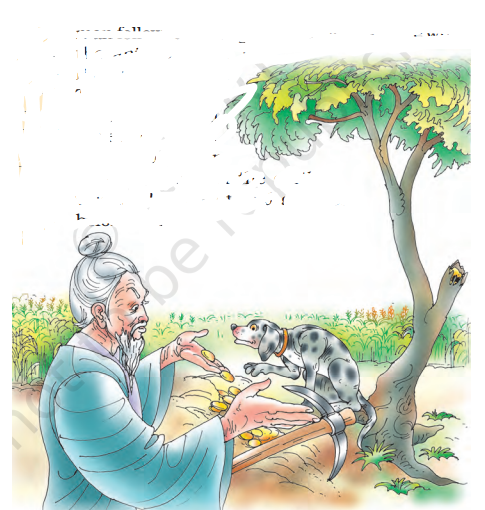The Ashes That Made Trees Bloom
In the good old days of the daimios, there lived an old couple whose only pet was a little dog. Having no children, they loved it as though it were a baby. The old dame made it a cushion of blue crape, and at mealtime Muko—for that was its name—would sit on it as snug as any cat. The kind people fed the pet with tidbits of fish from their own chopsticks, and all the boiled rice it wanted. Thus treated, the dumb creature loved its protectors like a being-with a soul.
The old man, being a rice farmer, went daily with hoe or spade into the fields, working hard from morning until O Tento Sama (as the sun is called) had gone down behind the hills. Every day the dog followed him to work, never once harming the white heron that walked in the footsteps of the old man to pick up the worms. For the old fellow was patient and kind to everything that had life, and often turned-up a sod on purpose to give food to the birds.
One day the dog came running to him, putting his paws against his legs and motioning with his head to some spot behind. The old man at first thought his pet was only playing and did not mind it. But the dog kept on whining and running to and fro for some minutes. Then the old man followed the dog a few yards to a place where the animal began a lively scratching. Thinking it was possibly a buried bone or bit of fish, the old man struck his hoe in the earth, when, lo! a pile of gold gleamed before him.
Thus in an hour the old couple were made rich. The good souls bought a piece of land, made a feast for their friends, and gave plentifully to their poor neighbours. As for the dog, they petted him till they nearly smothered him with kindness.
Now in the same village there lived a wicked old man and his wife, not a bit sensitive and kind, who had always kicked and scolded all dogs whenever any passed their house. Hearing of their neighbours’ good luck, they coaxed the dog into their garden and set before him bits of fish and other dainties, hoping he would find treasure for them. But the dog, being afraid of the cruel pair, would neither eat nor move.
Then they dragged him out of doors, taking a spade and hoe with them. No sooner had the dog got near a pine tree growing in the garden than he began to paw and scratch the ground, as if a mighty treasure lay beneath.
“Quick, wife, hand me the spade and hoe!” cried the greedy old fool, as he danced with joy.
Then the covetous old fellow, with a spade, and the old crone, with a hoe, began to dig; but there was nothing but a dead kitten, the smell of which made them drop their tools and shut their noses. Furious at the dog, the old man kicked and beat him to death, and the old woman finished the work by nearly chopping off his head with the sharp hoe. They then flung him into the hole and heaped the earth over his carcass.
The owner of the dog heard of the death of his pet and, mourning for him as if he had been his own child, went at night under the pine tree. He set up some bamboo tubes in the ground, such as are used before tombs, in which he put fresh flowers. Then he laid a cup of water and a tray of food on the grave and burned several costly sticks of incense. He mourned a great while over his pet, calling him many dear names, as if he were alive.
That night the spirit of the dog appeared to him in a dream and said, “Cut down the pine tree over my grave, and make from it a mortar for your rice-pastry and a mill for your bean sauce.”
So the old man chopped down the tree and cut out of the middle of the trunk a section about two feet long. With great labour, partly by fire, partly by the chisel, he scraped out a hollow place as big as a small bowl. He then made a longhandled hammer of wood, such as is used for pounding rice. When New Year’s time drew near, he wished to make some rice pastry. When the rice was all boiled, granny put it into the mortar, the old man lifted his hammer to pound the mass into dough, and the blows fell heavy and fast till the pastry was all ready for baking. Suddenly the whole mass turned into a heap of gold coins. When the old woman took the hand-mill, and filling it with beans began to grind, the gold dropped like rain.
Meanwhile the envious neighbour peeped in at the window when the boiled beans were being ground.
“ Goody me!” cried the old hag, as she saw each dripping of sauce turning into yellow gold, until in a few minutes the tub under the mill was full of a shining mass of gold.
So the old couple were rich again. The next day the stingy and wicked neighbour came and borrowed the mortar and magic mill. They filled one with boiled rice and the other with beans. Then the old man began to pound and the woman to grind. But at the first blow and turn, the pastry and sauce turned into a foul mass of worms. Still more angry at this, they chopped the mill into pieces, to use as firewood.
[To be Continued……………………]
